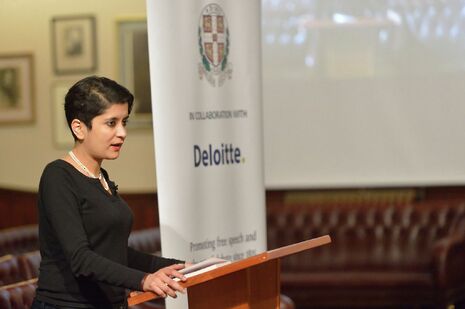Shami Chakrabarti: “We have to save the Human Rights Act”
In the wake of the Paris attacks, Theo Demolder speaks to the Director of Liberty about national security in Britain

“I have lived through previous terrorist attacks, in London, in New York, in Brighton. I saw people blown up on London buses; it’s horrible and it’s designed to terrorise. But do you hand your freedoms away as a result? I suggest that’s not a good idea.”
Four days after the horrific events in Paris, as concern about national security in Britain rises, it is timely that one of the greatest opponents of incursions on civil liberties is bringing this warning to the Union.
Shami Chakrabarti, the Director of the civil liberties campaign group Liberty and “the most dangerous woman in Britain” according to one Sun columnist, warned Cambridge students of the dangers of an authoritarian state.
She was eager to speak about the upcoming Investigatory Powers Bill, which would allow the mass collection of users’ internet records.
“Sometimes blanket surveillance isn’t just bad for privacy and liberty, it can be bad for security too. If you’re looking for a needle, don’t build a bigger and bigger haystack.”
For Chakrabarti, the bill “would actually undermine internet security in the name of counter terror”, and she has concerns over the ability of police and security services to hack websites and thus leave those sites vulnerable.
“We need the Investigatory Powers Bill, we just need it to be radically tightened up. We need a much more clever, rational, nuanced, proportionate approach, because sometimes privacy is security.”
Chakrabarti wants to speak about these issues in clear terms and she is keen to garner support by making people aware of what this would mean for their own personal privacy.
“It’s all very well to say ‘nothing to hide, nothing to fear’ but would you live with digital cameras and recording devices in your bedroom or in your living room? Most people would say no. We live very, very intimately online and so the same safeguards ought to apply.”
We then turned to the journeys into activism Cambridge students might take. At first she quipped that students should simply “join Liberty, immediately”.
She went on to argue that “it’s not enough just to like something or follow something, it’s important to join things. We can use the traditional tools of campaigning alongside new tools like social media to bring people together.”
In a more upbeat tone, she added: “Earlier, we talked about the internet in a slightly spooky way, but it’s also a wonderful, empowering, democratising device.”
But her biggest fight is yet to come. When I asked her about her ambitions for the future she replied decisively: “We have to save the Human Rights Act.”
Challenging the government’s intention to repeal the fifteen-year-old legislation, she warned that “there are some breathtaking attacks on personal privacy and everything that flows from that in that bill. It would leave every man, woman and child in this country incredibly vulnerable to abuses of power… it would deprive us of the opportunity even to challenge bad legislation.”
And it is the opportunity to challenge which has proven so crucial to Liberty under Chakrabarti’s leadership during clashes over the anti-terror measures implemented after 9/11 in various countries.
When the profile pictures change back, and public opinion comes to settle after the shock of Friday 13th, she hopes that her distinctly liberal pragmatism will win out over calls for security at any cost.
 Interviews / ‘People just walk away’: the sense of exclusion felt by foundation year students19 April 2024
Interviews / ‘People just walk away’: the sense of exclusion felt by foundation year students19 April 2024 News / Climate activists smash windows of Cambridge Energy Institute22 April 2024
News / Climate activists smash windows of Cambridge Energy Institute22 April 2024 News / Fitz students face ‘massive invasion of privacy’ over messy rooms23 April 2024
News / Fitz students face ‘massive invasion of privacy’ over messy rooms23 April 2024 News / Copycat don caught again19 April 2024
News / Copycat don caught again19 April 2024 News / John’s spent over 17 times more on chapel choir than axed St John’s Voices22 April 2024
News / John’s spent over 17 times more on chapel choir than axed St John’s Voices22 April 2024





